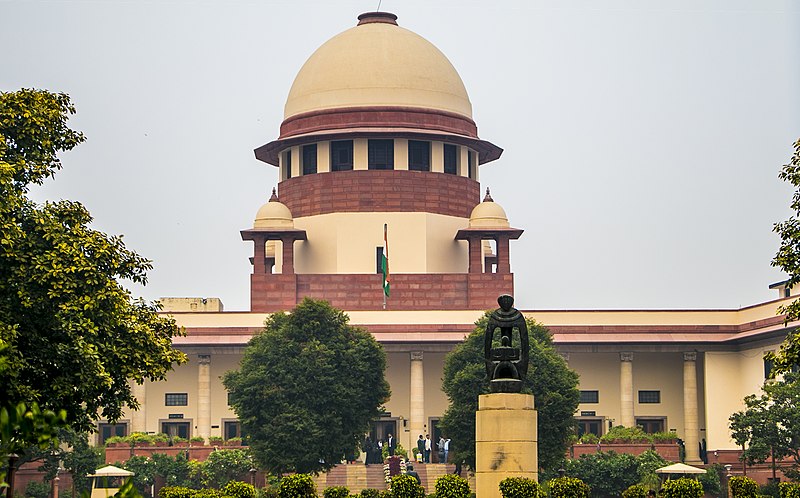With regard to the claim for payment of interest on refund of the amount which had been deposited by the appellants with the respondent – Delhi Development Authority to avail the benefit of the construction based on additional FAR. (Para 2)
The High Court having accepted the suggestion permitted the appellant to pay the said amount and avail the benefit. The appellants having deposited, availed the benefit and proceeded with the construction. (Para 3)
During the pendency of the writ petition, the respondent issued a notification dated 17.07.2012 whereby an amendment was made in para 6(g) to the notification dated 10.10.2008 and 23.12.2008 which were assailed before the High Court. By such amendment, it was provided that no additional FAR charges would be recovered from Educational Societies/Health Care and Social Welfare Societies having Income Tax Exemption. The said benefit became available to the appellants herein and as such the writ petitions pending before the High Court did not warrant an adjudication on the disputed questions. Therefore, the High Court in all the writ petitions which were pending before it had taken note of the change made through the subsequent notification and had accordingly disposed of the analogous matters in W.P.(C) No.8572 of 2009 and other petitions through the order dated 20.07.2012. In the said proceedings the deposit which had been made either before the High Court or by way of bank guarantees were permitted to be withdrawn. (Para 4)
It was directed that the refund be made within the period of eight weeks but the prayer for payment of interest was declined. It is in that light the appellant is before this Court. (Para 5)
In that view, an application was taken out by the said appellant herein on the aspect relating to interest and had sought refund of the amount with the interest at 15% per annum. The High Court having considered the matter was of the opinion that since the writ petitions were not ultimately adjudicated, the claim for interest would not be justified. (Para 6)
The said SLP came to be dismissed on 22.02.2013. In that view, insofar as the claim for pendente lite interest being declined insofar as the appellant in the second of the above-noted matters, it has attained finality. (Para 6)
Therefore, in the present facts as on the date when the writ petition was filed and the petitioner had voluntarily offered to deposit the amount, the amount was to be paid and recoverable under the notification dated 10.10.2008 and 23.12.2008 if the benefit of additional FAR was to be availed. The petitioners being desirous of availing the same and to proceed with the construction on obtaining the Sanctioned Plan had proceeded at ‘breakneck’ speed and had incurred the expenditure by offering to deposit the amount and avail the benefit instead of awaiting adjudication and thereafter availing. In that view, when as on the date the deposit was made, the notification remained valid and even subsequently there is no declaration that the notification and the demand made is illegal, but through the subsequent notification an exemption has been granted by the respondents themselves to a certain category of institutional plots to avail additional FAR without levying such charges, it is not the case where any of the principles as enunciated in the above-noted decisions would apply herein. (Para 13)
As noted, the circumstances in which the deposit was made is not in a situation where the appellant has suffered any loss due to the ‘Act of Court’ in the sense it ought to be construed. Further, insofar as the respondent is concerned, the notification providing for additional FAR charges was in force on the date when the deposit was made. (Para 14)
However, insofar as the non-refund of the amount for a longer period even after the expiry of the period permitted by the Court, admittedly the appellant in the first of the above cases has initiated separate proceedings. In that regard, all contentions are kept open and none of the observations made in deciding the issue herein would prejudice the parties in seeking adjudication of their contentions therein. (Para 14)
Whereby a direction had been issued to refund the deposit which had been made. In that light, the appellant had sought for a direction, to be compensated. The High Court while disposing of the contempt petition has taken into consideration that there was no adjudication on merits and, therefore, the payment of interest or compensation would not arise. (Para 15)
Where subsequently the amount has been refunded and the contempt, if any, to that extent is purged, the ultimate conclusion to dispose of the contempt petition by the High Court, in any event, is justified and we see no error committed so as to interfere. (Para 16)
Therefore, in a similar manner in which the appellants in the first of the above appeals have availed their remedy, it would be open for the appellant in the second of the above appeals also to avail the remedy before the appropriate forum, in accordance with the law. All contentions of both parties in that regard are left open. (Para 16)
SUPREME COURT OF INDIA
2023 STPL(Web) 240 SC
[2023 INSC 797]
Lal Bahadur Shastri Educational Society & Anr. Vs. Delhi Development Authority & Ors.
Civil Appeal No. 5647 of 2023 (Arising out of SLP (C) No.31548 of 2014) With Civil Appeal No. 5648 of 2023 @ SLP (C) No. 2009 of 2015-Decided on 5-9-2023
https://stpllaw.in/wp-content/uploads/2023/09/2023-STPLWeb-240-SC.pdf







